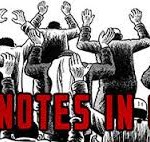Roger Cohen gives us the politics of despair. On the one hand, his recent OpEd in the New York Times, “A Mideast Truce” shows us what a long way we’ve come in editorial coverage of the Israel-Palestine conflict. He’s clear about the horrendous reality of Israel’s settlements, even though he stops short of naming it as the colonial project that it is. He calls the separation wall a “land grab” and credits it for shattering Palestinian lives — even though he persists in advancing the inane claim that it has protected Israel from suicide bombers. Perhaps most important, he focuses on the fact that Israelis have literally and psychologically walled themselves off from Palestinians. And he quotes Israeli author David Grossman’s crucial observation that Israelis, despite their military might, see themselves and continue to act as victims. Basically, he’s got it — he describes the current situation.
But what is the conclusion that he draws? That we should give up on peace. That we should settle for, in his words, “a truce of the mediocre.” And why? Because the “two sides” cannot come to an agreement. Settle for the status quo, he says, and keep it the way it is. This, like Tom Friedman’s recent piece that recommended that the US pull back from its fruitless attempt to mediate because “neither side” is able or willing to make peace, is fundamentally wrong headed. And the reason is to be found in the concept of “two sides.” This concept, like the request for “balance” that so many of us working on this topic hear so often, is based on and advances a fallacy. It’s the fallacy contained in Cohen’s equation of Hamas’ “annihilationist ideology” with the spread of illegal Jewish settlements: the implicit point is that here we have two evils facing off.
As long as we persist with this idea of two sides (the conflict between two rights, two claims; the clash of two wrongs, etc.) we will continue to remain as stuck as we are and we will yield to the politics of despair.
There are not two sides, arrayed in equal moral and physical forces on a level field. Rather what we have is one side, all-powerful, with a powerful friend at its back, crushing the other. It’s been going on for over 60 years.
When will we finally see this, “we” being the United States of America, which funds and diplomatically enables the continued dispossession and ethnic cleansing of the indigenous Palestinians?
Cohen’s conclusions can only be reached through a denial of this fundamental truth. Accepting the status quo will not being a truce. The injustice prevailing in historic Palestine — systematic, egregious and far-reaching — will continue to produce popular resistance: some of nonviolent, some of it violent. There will be no truce. And nothing resembling peace. Not until the fundamental injustice of the situation is recognized and addressed — by the United States of America.
And this fundamental change in US policy will only come about if and when the American people demand it. Evangelical and founder of the Sojourners movement Jim Wallis tells us that when politics fail to bring about the redress of fundamental injustice in the political system, broad social movements arise to “change the wind” — to make the politicians, their moistened fingers always in the air, do what has to be done. That movement is here, and it is growing — the movement at the grassroots, to change the wind.
That’s the politics of hope.















